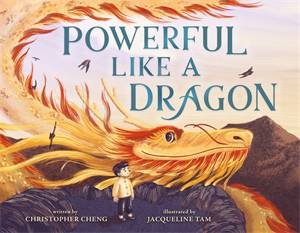Powerful like a dragon by Christopher Cheng & Jacqueline Tam

Christmas Day 1941 at the height of World War II. Japan has bombed Pearl Harbour in Hawaii, bringing the USA into the war, and the governor of the British colony of Hong Kong has just surrendered to the imperialist Japanese army as they continue their seemingly inexorable march south towards Australia. Shu Lok was too young to know there was even a war on until it literally arrived on the doorstep of his village home and he hid behind his Baba as the soldier shouted and poked and spat. And before he knew it, he was put into a large basket with his cousin to be carried with another cousin in another basket for hundreds of miles into China, fleeing the invaders along with many of the villagers, mostly relatives.
However, Shu Lok's parents decided not to leave, and the last words he heard were his father telling him to be "powerful like a dragon".
Thus, hoisted on the end of a pole on his uncle's shoulders, Shu Lok's new life began - a life of being bounced around for endless hours, the occasional opportunity to climb out of the basket to stretch his cramped body and feast on cold bean curd cake, after having had only a few soybeans tied in a bag around his neck to nibble on during the day. As they moved into the mountains and his uncle removed his own shirt to keep Shu Lok a little warmer at night, he learned what the snow-covered mounds at the side of the road meant, and still they travelled on...
But whenever things got tough he remembered his father's words "be powerful like a dragon" and from somewhere deep inside came the strength to take one more step...
This is a story that is just like its title. It's "powerful like a dragon" and not just because it is the retelling of my friend Christopher Cheng's family story told to him decades later by his uncle, the real Shu Lok. It is a story for all ages as Jacqueline Tam's haunting illustrations offer so much more to think about beyond Cheng's masterful words, their almost-monochromatic palette echoing the bleakness and uncertainty of the future, but brightening with images of the dragon when Shu Lok recalls his father's words. No matter the challenge - having to swallow his hunger even through the tantalising smell of the hawker's sweet corn roasting; having to pay precious money to warlords for the right to cross their land; having to bandage his uncle's blistered bare feet because his sandals had long disintegrated - he thought of the power of the dragons to overcome and like the others, kept on and on and on...
As well as being a story of courage, resilience and hope because of the belief in a better future, it is all the more poignant because it is true. And it makes the reader think of how many of our students have had to endure the same sort of hardships as they have been displaced from their homes to flee tyranny, the journeys they've had, the challenges they've overcome and the courage and resilience they have displayed. How have they had to be "powerful like a dragon"? Or perhaps their journey has been one of illness, family breakup or other life-changing circumstance... And while the journey may have been tough, was it worth it? How did it impact the you that you are now?
One might also wonder why Shu Lok's baba meant when he said be "powerful like a dragon'. Why not some other creature like a lion or elephant? Did he mean physically powerful or perhaps mentally powerful - for Shu Lok to face his fears and demons and fight them with his mind rather than his fists? Is it possible to be courageous and brave without being combative, belligerent or aggressive? Does the dragon have a different role or symbolic presences in Eastern cultures compared to Western culture?
In the extensive author's notes, Cheng offers a lot of background information about his uncle's journey, giving it not only authority and authenticity but also opening up the possibility that other families might have similar stories to tell but which have been hidden for decades for one reason or another. I know both my father and father-in-law never talked about their wartime experiences because while both had extraordinary times as prisoners of war of the Germans and Japanese, respectively, their stories pretty much went with them to their graves. Therefore, perhaps this book could be the impetus for older students to probe their family histories before it is too late.
This review and the possibilities that this story opens up only scratch the surface. The more times I read it the more it reveals - as I said, it is "powerful like a dragon'.
While One Child will always be my favourite title by Chris for a whole lot of reasons, this one is a close second.
Themes: Refugees, World War, 1939-1945, Hong Kong - History, Resilience.
Barbara Braxton